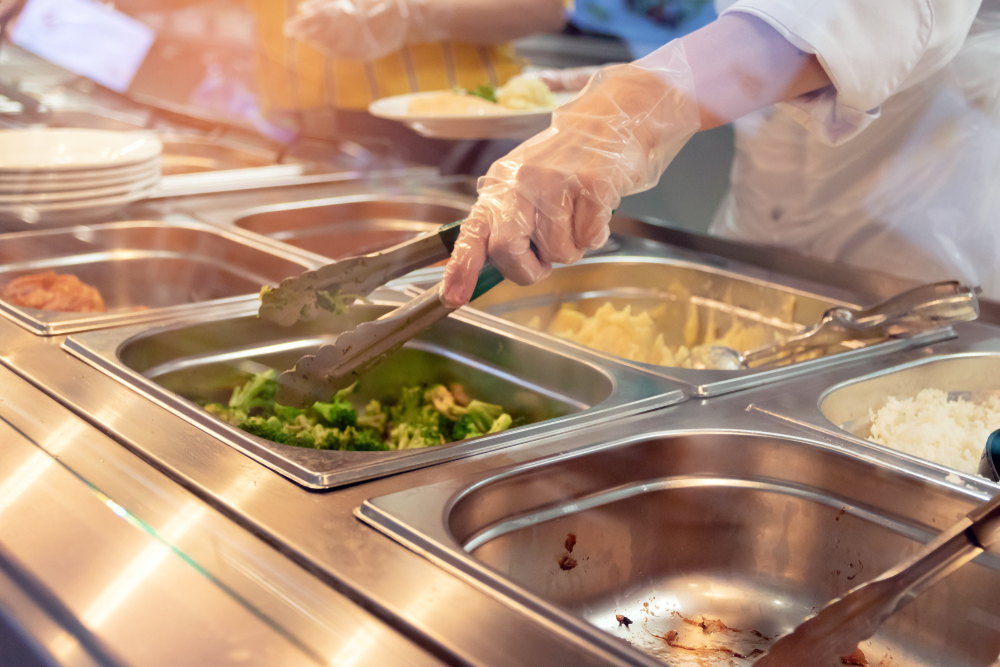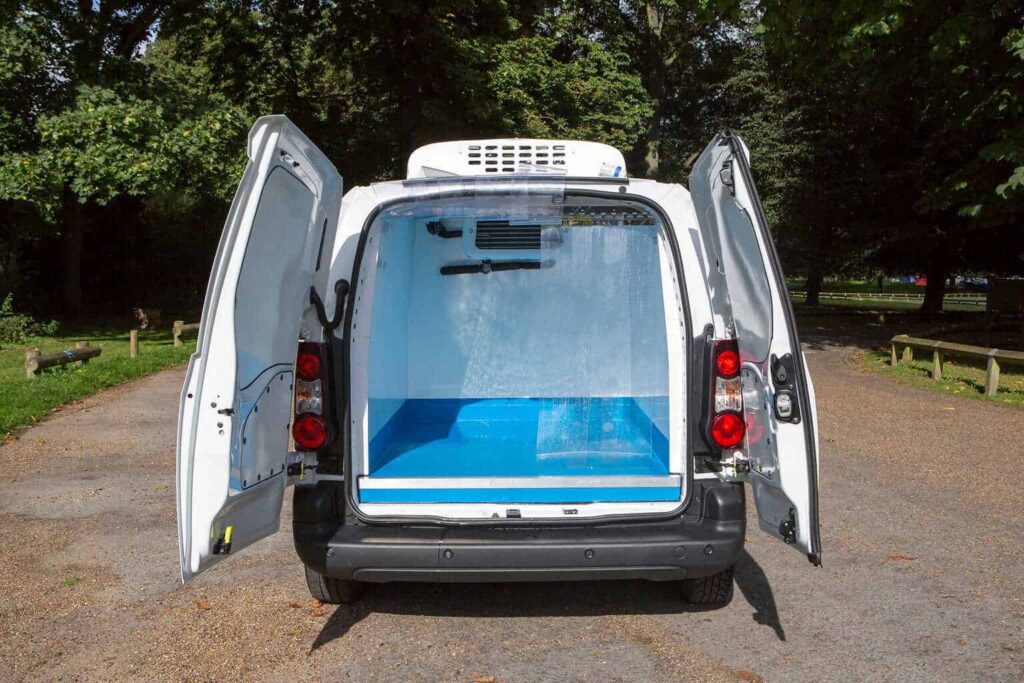For schools across the UK, ensuring pupils have access to fresh, nutritious food daily is essential. With many children relying on school meals for their daily sustenance, schools are under increasing pressure to guarantee that food deliveries are safe, timely, and of high quality.
This responsibility extends beyond kitchen staff and school administrators to the businesses that deliver food and other perishables to school canteens. Central to these operations are refrigerated vans, which play a crucial role in maintaining the freshness and safety of the food upon which so many children depend.
In recent years, UK schools have faced significant cuts in real terms to their budgets, which has put immense pressure on their ability to manage resources effectively. Despite government claims of increasing education funding, inflation and rising operational costs have meant that many schools are dealing with less money to cover essential services, including staffing, maintenance, and pupil provisions.
This financial squeeze has forced schools to make difficult choices, often cutting back on non-core activities and services to prioritise basic needs. In the context of food delivery, the need to balance cost with quality has become even more challenging, as schools strive to provide nutritious meals for pupils while keeping expenses as low as possible. This budgetary strain makes it crucial for schools to partner with reliable and cost-efficient suppliers who can ensure safe, high-quality food delivery without compromising on price.
Here, we will explore the challenges schools face in securing reliable and cost-effective food delivery services, the role businesses play in meeting these needs, and how specialist companies like FridgeXpress support these efforts through flexible and dependable refrigerated van solutions.
The Importance of Fresh Food for Schools
Ensuring that food is delivered fresh is not merely a matter of taste or convenience; it’s a matter of health. Food that is improperly stored or transported at the wrong temperature can spoil quickly, leading to waste and, worse still, potential health risks.
Children are particularly vulnerable to foodborne illnesses, so maintaining the cold chain—an unbroken refrigeration system from storage to delivery—is paramount.
Refrigerated vans are key to ensuring that fresh ingredients, from dairy products to fruits and vegetables, arrive in prime condition. These vans are equipped with temperature control systems that keep perishable goods within a specified temperature range, preventing spoilage and ensuring that food retains its nutritional value.
For schools, this is especially important as they plan meals and depend on timely deliveries. Fresh ingredients must arrive just in time for preparation—early enough to fit the kitchen schedule, but not so early that it risks spoiling before it’s served to pupils. The logistics behind this are complex, and schools need delivery services they can trust.
Challenges Schools Face in Food Delivery
School heads and their staff face several challenges when it comes to the ordering and supply of food and other perishables. Here are the main ones:
1. Budget Constraints
One of the biggest challenges schools face is budget management. With limited funding, schools are constantly under pressure to deliver high-quality meals while keeping costs down. This is especially true for state-funded schools that are expected to provide meals at a subsidised rate, yet still need to meet national nutrition standards.
This can create a dilemma for schools when it comes to selecting delivery services. On one hand, they need to ensure that the food is transported in conditions that maintain safety and quality, which often requires the use of specialised refrigerated vans. On the other hand, hiring premium delivery services can strain already tight budgets.
Schools must strike a delicate balance between cost and quality. Choosing unreliable delivery services or ones that cut corners on refrigeration can result in spoiled goods, meaning wasted money and food that can’t be served. Worse still, it risks compromising the health of the pupils.
2. Consistency and Reliability
For schools, consistency is everything. The daily schedule is strict, and any delays or failures in food deliveries can throw the entire day into disarray. A late or missed delivery might mean a last-minute scramble to find alternative meal options, which could compromise the nutritional quality of the food served to pupils. In extreme cases, it might mean no food at all.
A reliable refrigerated van service ensures that fresh ingredients arrive as planned, allowing schools to prepare and serve meals without disruption. However, this reliability can be hard to come by, particularly in regions where access to quality delivery services is limited or where suppliers may be overbooked during peak times.
3. Maintaining the Cold Chain
One of the biggest challenges when delivering perishables is maintaining the cold chain. Any break in this chain—whether through faulty refrigeration, delays in delivery, or improper handling—can lead to the degradation of food quality. Once the cold chain is broken, even for a short period, the risk of bacterial growth and spoilage increases dramatically.
For schools, receiving food that has been transported under improper conditions is unacceptable. Not only does it pose a health risk, but it also disrupts meal planning. If an order of fresh dairy or meat products is spoiled, it must be replaced quickly, leading to additional costs and potential shortages in the school kitchen.
Benefits Delivery Companies Can Offer Schools
For food suppliers and delivery companies, the challenges schools face present an opportunity to demonstrate value by offering solutions that address the need for cost-effective, reliable, and safe food transportation.
Businesses that supply schools with perishables must go beyond simply delivering goods; they must provide peace of mind that their service meets the highest standards.
1. Cost-efficient Solutions
One way delivery companies can help schools is by offering cost-effective solutions that meet their budget constraints without compromising on quality. This could include optimising delivery routes to minimise costs, offering bulk delivery discounts, or providing flexible payment terms. By working closely with schools to understand their needs, suppliers can create tailored delivery packages that ensure quality at a competitive price.
2. Advanced Refrigeration Technology
The use of modern refrigerated vans equipped with advanced temperature monitoring systems is another key advantage that delivery companies can offer schools. These vans maintain the cold chain throughout the journey and are designed to alert operators to any changes in temperature that could compromise the safety of the goods being transported. This ensures that schools receive fresh, safe food on every delivery.
In addition to ensuring the quality of the food, this kind of technology also reduces the risk of spoilage, saving both the supplier and the school from the costs associated with wasted food.
3. Flexible Delivery Options
Flexibility is crucial for schools, particularly when it comes to scheduling deliveries. Schools may require deliveries at specific times to fit their kitchen schedule or need last-minute orders during busy periods such as the start of term. Delivery companies that offer flexible options, such as same-day or next-day delivery, can set themselves apart from competitors by providing a service that meets the dynamic needs of schools.
4. Choosing the Right Partners
Suppliers must collaborate with the right partners to effectively reduce costs for their customers, particularly in the competitive landscape of food delivery to schools.
By forming strategic alliances with businesses that offer reliable logistics solutions, such as refrigerated van services, suppliers can enhance their operational efficiency and maintain quality while keeping expenses in check.
These partnerships enable suppliers to optimise their supply chains, reduce waste, and leverage economies of scale, ultimately passing on savings to schools. As budget constraints continue to challenge educational institutions, such collaborative efforts are essential for ensuring that schools receive fresh, nutritious food at a competitive price.
5. Working Directly with School Administrators
Building strong relationships with school administrators is crucial for suppliers in the food delivery sector, as it allows them to gain a deeper understanding of the unique needs and challenges faced by educational institutions.
By engaging directly with administrators, suppliers can better align their services with the specific requirements of each school, whether that involves adjusting delivery schedules, providing tailored meal options, or ensuring that dietary restrictions are met. This level of communication fosters trust and reliability, which are essential for long-term partnerships.
Furthermore, understanding the priorities and constraints of school administrators enables suppliers to offer solutions that not only meet immediate needs but also anticipate future demands. For example, by collaborating closely with schools, suppliers can help implement strategies to reduce food waste, optimise inventory management, and identify cost-saving opportunities.
Such proactive engagement not only enhances the overall service experience but also positions suppliers as valuable partners in the educational community, contributing to the well-being of students while supporting schools in achieving their nutritional and budgetary goals.
The FridgeXpress Advantage for Delivery Companies
While delivery companies play an important role in supplying schools with fresh food, they too face logistical challenges, particularly when it comes to managing their fleet of refrigerated vans. This is where FridgeXpress can provide critical support.
FridgeXpress specialises in the hire and long-term lease of refrigerated vans of all sizes, offering a wide range of solutions to businesses involved in food delivery. Partnering with FridgeXpress can provide significant advantages for companies delivering perishables to schools:
1. Fleet Flexibility
One of the key benefits of working with FridgeXpress is the ability to scale up or scale down your fleet as needed. Delivery companies often experience fluctuations in demand, especially around peak periods such as the start of the school year or during the holiday seasons. FridgeXpress offers flexible hire options, allowing companies to increase their fleet size temporarily without committing to long-term contracts. This means that you can meet short-term demand spikes without overextending your resources.
2. Minimising Downtime with Replacement Vans
Another major advantage of partnering with FridgeXpress is the ability to minimise downtime in case of vehicle breakdowns. If one of your refrigerated vans is out of commission due to mechanical failure, FridgeXpress can provide a replacement vehicle quickly, ensuring that your deliveries to schools remain on schedule. This level of reliability is crucial when dealing with perishables, where any delay could result in spoiled goods and lost revenue.
3. Cost-effective Long-term Leasing
For companies that require a consistent fleet size throughout the year, FridgeXpress also offers long-term lease agreements that include maintenance and repair services. This eliminates the need for businesses to invest heavily in their fleet while still ensuring access to high-quality, well-maintained vehicles.
By outsourcing fleet management to FridgeXpress, delivery companies can reduce their overhead costs and focus on what they do best—delivering fresh food to schools.
4. Advanced Technology and Support
FridgeXpress’s fleet is equipped with advanced temperature control technology, ensuring that all deliveries meet the stringent requirements of food safety regulations.
Their vehicles are designed to maintain precise temperatures throughout the delivery process, and real-time monitoring allows for immediate intervention if any issues arise. This level of control helps delivery companies provide schools with the assurance that their food is arriving in optimal condition.
Ensuring Freshness with FridgeXpress
As schools across the UK continue to provide meals to pupils, the need for reliable, cost-effective, and safe food delivery services is more important than ever.
Businesses involved in the supply of perishables to schools face a unique set of challenges, from maintaining the cold chain to meeting strict budget requirements. By working closely with schools, delivery companies can offer valuable solutions that ensure the quality and safety of food from farm to canteen.
FridgeXpress plays a vital role in supporting these delivery companies by offering flexible refrigerated van hire and long-term leasing options. With their fleet of temperature-controlled vehicles and commitment to customer service, FridgeXpress helps businesses ensure that fresh food reaches schools on time and in perfect condition.
Whether it’s scaling up fleet size to meet seasonal demand or providing replacement vans during breakdowns, FridgeXpress is a trusted partner for companies delivering fresh food to schools across the UK.
In a world where the health and nutrition of pupils depend on timely and safe food deliveries, the right partnership makes all the difference. With FridgeXpress, delivery companies can be confident that they have the support they need to keep schools stocked with fresh, high-quality food—day after day.
Find out how FridgeXpress can help your delivery business. Contact their expert team today.




